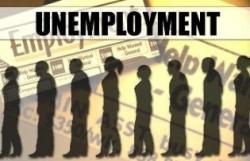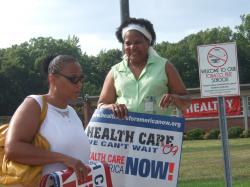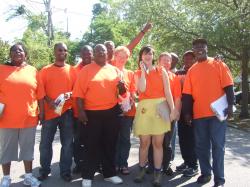 The policies, programs and priorities of the US government in dealing with the economy have always favored the rich over the needs of the masses of working class and poor people. Corporate deregulation, free trade agreements, anti-labor, anti-immigrant and racist, sexist and homophobic laws, along with massive spending on unjust wars, have helped to bring about the current crisis in the US and global economy.
The policies, programs and priorities of the US government in dealing with the economy have always favored the rich over the needs of the masses of working class and poor people. Corporate deregulation, free trade agreements, anti-labor, anti-immigrant and racist, sexist and homophobic laws, along with massive spending on unjust wars, have helped to bring about the current crisis in the US and global economy.
The massive unemployment is a major aspect of the crisis facing the US working class. Some estimate the real unemployment at 25 million and growing. Youth unemployment, especially among African Americans is over 40 percent.
The big corporations that closed profitable companies in the US over the past 30 years, to relocate to other countries to exploit cheap labor for greater profits, affecting worker’s pensions and healthcare coverage; and the banks that financed these corporate runaways and overpriced mortgages on refinanced homes for workers, are receiving hundreds of billions of dollars from the federal government to “stimulate” the economy, while the conditions of the working class get worse.
The funding for the education that is suppose to allow workers to “compete” in the global economy, is being cut in order to bail out the rich. Working class young people are told to join the military and fight and die in unjust wars as the way to get an education.
A federally funded and corporate taxed jobs program must be part of the answer in addressing the crisis facing the working class. A jobs program must have as its first priority, addressing the social problems facing the working class: the construction of affordable housing, universal healthcare and the construction of more hospitals and clinics; the construction of schools; the conversion of plants to serve the needs of the communities, especially the most oppressed; and cleaning up the environment. Such a jobs program can create millions of family supporting and socially developing and productive jobs.
However, history shows that it takes a massive movement among the people, especially the working class, and led by the most oppressed sectors, to bring about the changes that benefit the masses of people. This was true in the struggle to end slavery; and during the civil rights period in the 1950s and 60s under the leadership of Dr. Martin L. King, Jr. and the many young activists that worked tirelessly to organize and empower people.
We cannot allow our deserved pride of electing a Black president, to silence our historical struggle for justice, democracy, power and liberation. There is too much at state not to hold everyone accountable for using their positions of power in government, and in organizing and mobilizing the power of the people, to help address the needs of the masses in finding solutions to the economic crisis, and to the capitalist system that continuously causes these crisis.
The fight for jobs must be organized in every city and community. The trade unions must take up the fight for jobs, both in defense against the attacks on their members who are becoming increasing unemployed, and to help to build and support coalitions and unemployed councils that give the millions of workers, employed and unemployed and their allies, the organizations and a broad framework to fight for jobs, unionization and worker empowerment.
Peoples Assemblies should hold unemployed worker speak outs and rallies in communities and at unemployment offices to form unemployed councils, that develop the demands for jobs and income, and to build a powerful local, statewide and national movement for jobs.
Join or Form Peoples Assemblies and Help Build the Fight for Jobs.






